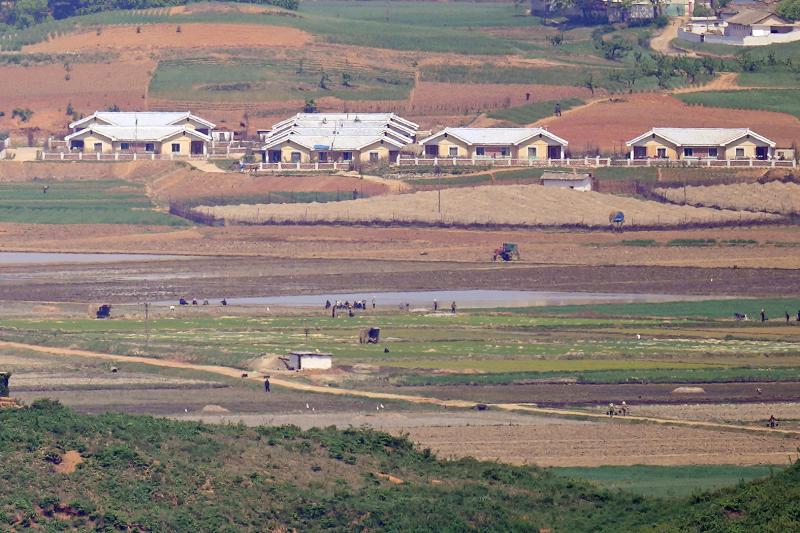North Korea yesterday imposed a nationwide lockdown to control its first acknowledged COVID-19 outbreak after saying for more than two years that it had a perfect record keeping out the virus that has spread to nearly every place in the world.
The size of the outbreak was not immediately known, but it could have serious consequences, because the country has a poor healthcare system and its 26 million people are believed to be mostly unvaccinated against COVID-19.
Some experts say that the North, by its admission of an outbreak, might be seeking outside aid.

Photo: AP
The North’s Korean Central News Agency (KCNA) said that tests of samples collected on Sunday from an unspecified number of people with fevers in the capital, Pyongyang, confirmed they were infected with the Omicron variant of SARS-CoV-2.
In response, North Korean leader Kim Jong-un during called for a thorough lockdown of cities and counties, and said that workplaces should be isolated by units to block the virus from spreading, KCNA said.
Kim urged health workers to step up disinfection efforts at workplaces and homes, and mobilize reserve medical supplies.
It was crucial to stabilize transmissions and eliminate the infection source as fast as possible, while also easing the inconveniences to the public caused by the virus controls, he said.
The country would surely overcome what he described as an unexpected outbreak, because its government and people are “united as one.”
North Korea, which continues to employ one of the world’s most restrictive border controls, did not provide further details about its lockdown.
A photographer on the South Korean side of the border saw dozens of people working in farm fields or walking on footpaths at a North Korean border town — an indication that the lockdown does not require people to stay home, or it exempts farm work.
The measures described in state media and Kim’s declaration that economic goals should be met possibly indicate that North Korea is not strictly confining people to their homes, and is focusing more on restricting travel and supplies between regions to slow the viral spread, analyst Cheong Seong-chang at South Korea’s Sejong Institute said.
The North’s government has shunned vaccines offered by the UN-backed COVAX distribution program, possibly because those have international monitoring requirements.
The South Korean Ministry of Unification, which handles inter-Korean affairs, said that Seoul is willing to provide medical assistance and other help to the North based on humanitarian considerations.
Relations between the Koreas have deteriorated since 2019 amid a stalemate in nuclear negotiations and the North’s increasingly provocative weapons demonstrations.
Kim Sin-gon, a professor at Seoul’s Korea University College of Medicine, said North Korea likely is signaling its willingness to receive outside vaccines shipments, but wants many more doses than offered by COVAX to inoculate its entire population multiple times.
North Korea would also want COVID-19 medicines as well as medical equipment shipments that are banned by UN sanctions, he said.

Drug lord Jose Adolfo Macias Villamar, alias “Fito,” was Ecuador’s most-wanted fugitive before his arrest on Wednesday, more than a year after he escaped prison from where he commanded the country’s leading criminal gang. The former taxi driver turned crime boss became the prime target of law enforcement early last year after escaping from a prison in the southwestern port of Guayaquil. Ecuadoran President Daniel Noboa’s government released “wanted” posters with images of his face and offered US$1 million for information leading to his capture. In a country plagued by crime, members of Fito’s gang, Los Choneros, have responded with violence, using car

Two former Chilean ministers are among four candidates competing this weekend for the presidential nomination of the left ahead of November elections dominated by rising levels of violent crime. More than 15 million voters are eligible to choose today between former minister of labor Jeannette Jara, former minister of the interior Carolina Toha and two members of parliament, Gonzalo Winter and Jaime Mulet, to represent the left against a resurgent right. The primary is open to members of the parties within Chilean President Gabriel Boric’s ruling left-wing coalition and other voters who are not affiliated with specific parties. A recent poll by the

TENSIONS HIGH: For more than half a year, students have organized protests around the country, while the Serbian presaident said they are part of a foreign plot About 140,000 protesters rallied in Belgrade, the largest turnout over the past few months, as student-led demonstrations mount pressure on the populist government to call early elections. The rally was one of the largest in more than half a year student-led actions, which began in November last year after the roof of a train station collapsed in the northern city of Novi Sad, killing 16 people — a tragedy widely blamed on entrenched corruption. On Saturday, a sea of protesters filled Belgrade’s largest square and poured into several surrounding streets. The independent protest monitor Archive of Public Gatherings estimated the

Irish-language rap group Kneecap on Saturday gave an impassioned performance for tens of thousands of fans at the Glastonbury Festival despite criticism by British politicians and a terror charge for one of the trio. Liam Og O hAnnaidh, who performs under the stage name Mo Chara, has been charged under the UK’s Terrorism Act with supporting a proscribed organization for allegedly waving a Hezbollah flag at a concert in London in November last year. The rapper, who was charged under the anglicized version of his name, Liam O’Hanna, is on unconditional bail before a further court hearing in August. “Glastonbury,